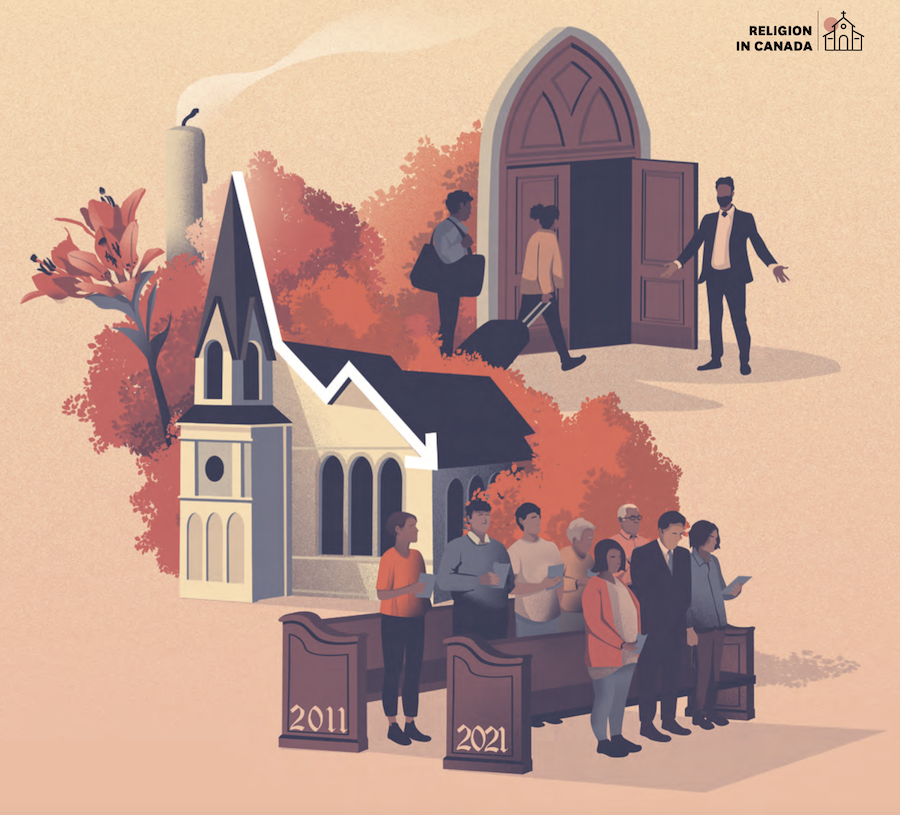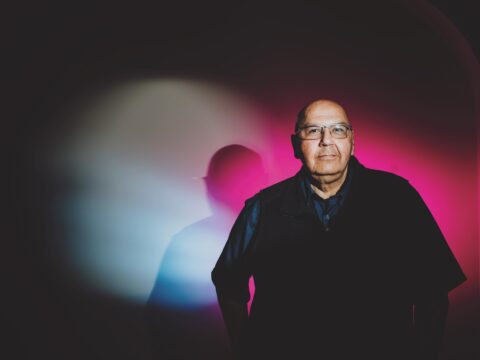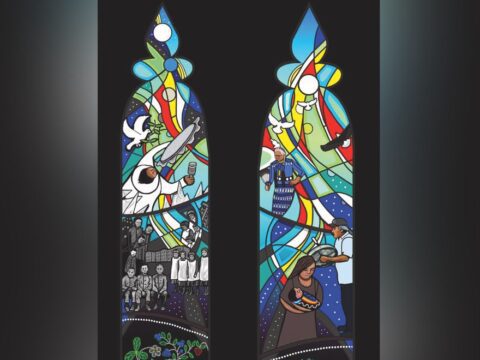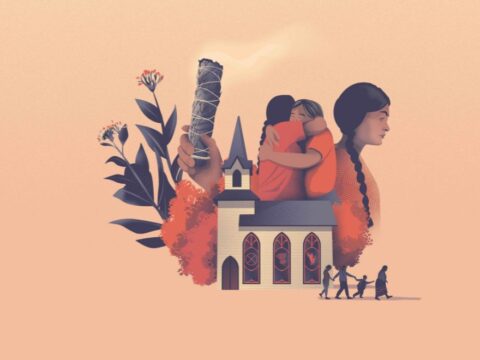Canada’s largest Protestant denomination is shrinking the fastest. The latest census paints a grim picture of The United Church of Canada, which lost a whopping 40 percent of affiliates between 2011 and 2021, falling to 1.2 million people from roughly two million.
“Affiliates” are people who self describe in the census as having a United Church identity, but they may never go to church. In the same 10-year time period, the United Church tracked membership dropping from about 480,000 to roughly 350,000 people, and church attendance declining from over 165,000 to under 120,000 people.
Rev. Michael Blair, the general secretary of the United Church, says he’s not surprised by the numbers. “All the institutions of our age are experiencing the same decline,” he says. He also wonders if the revelations of unmarked graves at former church-run residential schools in 2021 — the same year that the census data was collected — affected the responses. “People may have distanced themselves from the church,” he speculates.
United Church affiliates don’t only skew older — they also skew more white. Among Christian denominations, the United Church has one of the lowest percentages of racialized affiliates at only 2.5 percent. Compare that to six percent of Anglican or 45 percent of Pentecostal affiliates.
Blair says this is due, among other things, to the United Church’s lack of an international identity. “Newcomers and diasporic communities that come into the Canadian landscape don’t easily recognize the United Church.” He also says they encounter a style of worship here that they aren’t necessarily comfortable with.
Kevin Flatt, the author of After Evangelicalism: The Sixties and the United Church of Canada, says that the United Church is experiencing a “catastrophic decline” in membership, and the dwindling numbers are part of a broader trend stretching back decades.
Flatt agrees that unmarked graves could affect affiliation and that COVID-19 may have affected attendance — but acknowledges it’s “hard to say exactly what’s going on.” Overall, he believes United Church theology is the main cause of its decline. “The more liberal or progressive churches have a harder time answering the question ‘Why do we need to exist?’” Flatt says. When a plethora of community groups already organize around causes like climate change and reconciliation, he notes, why would people bother going to church?
Under Blair’s leadership, the denomination is hoping to change course. With a pledge to create 100 new faith communities in the next three years, the national office will be rolling out the welcome mat to immigrant communities. “We’re at the point now where we recognize that our comfort level needs to change,” he says. “We have to decide, do we want to be an enclave? Or do we want to…reflect the Canadian reality?”
More on Broadview:
- The United Church needs to do a better job of attracting young adults
- The United Church of Canada is healthier than most people think: Brian Arthur Brown
- The United Church has an ambitious plan to grow its membership
Some immigrant United Church congregations already exist. Ghana Calvary Methodist United Church in Toronto was established in 1996, for example. Its worship style is more charismatic than one would find in a typical United church, but minister Rev. Eric Nyarko says he appreciates the denomination’s theological openness.
Nyarko says he got a “yes-and-no answer” when he asked his board if the United Church was a good fit. There are differences that strain the relationship, he says. For example, same-sex relationships are illegal in Ghana. But, Nyarko adds, the leadership is “very happy that the UCC has not imposed something that is against their culture.”
Blair says that the national office recognizes the need to maintain the United Church ethos, but suggests it’s easier said than done. “Our commitment around LGBT inclusion is not something that sits easy with some of our migrant communities,” he admits.
What would the people in the pews look like if Blair’s plan to create new faith communities gets off the ground? It’s hard to say exactly, but certainly they would be more diverse, and not just racially, ethnically and culturally. And while the United Church will almost assuredly not return to its heyday of the 1960s, it could continue to exist — just in new ways.
There’s a “gift in the numbers that in some ways gets our heads out of the sand,” Blair says.
***
Julie McGonegal is a writer and editor in Guelph, Ont.
This story first appeared in Broadview’s June 2023 issue’s Religion in Canada series with the title “Inside the United Church’s Decline.”
















Rev Blair hits on a good point regarding newcomers and their evolving views on LGBTQ. Do we call in or call out? Change won’t happen with calling out will it. That just shuts doors.
This is very interesting but not surprising that newcomers are not comfortable with the style of worship in United churches. What is glaringly obvious to me, and countless others as a member in a rural prairie congregation , is that the United Church of Canada has no mention or consideration for faith communities who are struggling mightily to stay open let alone flourish. We know we have lost a whole generation of attendees whose children did not grow up in the church, but we remote members do need to be, at the very least, have our dilemmas be recognized and acknowledged by the governing bodies of the church.
Why not reach out to migrant workers and international students for a start? Maybe ask every family in the congregation to “adopt” someone to bring them into the UCC? What about special ministry focused on postsecondary institutions? I’m surprised that the UCC never reached out to university and colleges either.
The possibilities are endless!
This is an nonsense filled article. Came across it today [Apr. 1st. 2024] The United Church needs to get back to original beliefs of the church that the Catholic Magisterium teaches.
The whole United church has its head in the sand believing more climate change antics i.e. Mardi Tindal etc. and rainbow stoles and crosswalks will be the way of the future along with “I’ll interpret the scriptures the way I want syndrome.” The United Church is on its way off the map due to all the liberal nonsense it spews to its members. How do their current members stand all this?
The unmarked graves have had Canadians looking at the church as a whole…Catholic, Evangelical, United, Anglican. The un-churched do not care what flavour of Christianity did the damage. They are blaming anything Christian, so to think the decline in members and attendees is due to the unmarked graves could not be more incorrect and it shows the United Church’s leadership’s lack of truly looking at what the issue is because the other churches are not seeing near the decline that the United Church is seeing.
As Flatt states, “When a plethora of community groups already organize around causes like climate change and reconciliation, why would people bother going to church?”
The United Church has pushed Jesus aside to make room for their own liberal doctrine. The gospel of Jesus Christ is secondary to an inclusion ideal that actually looks more exclusive than inclusive.